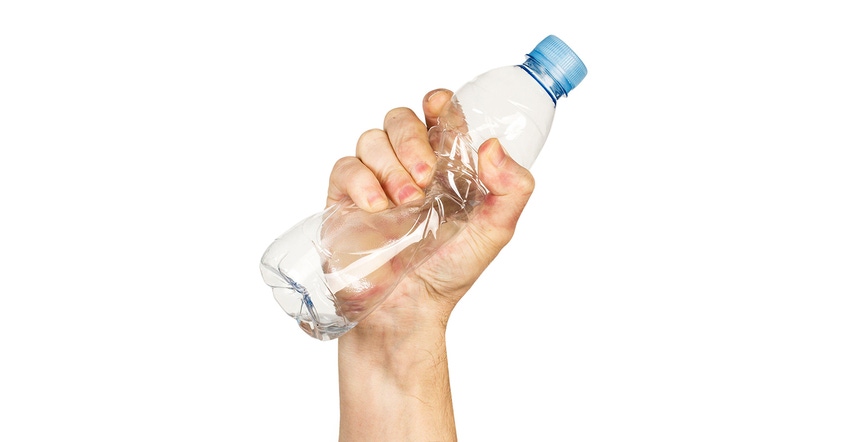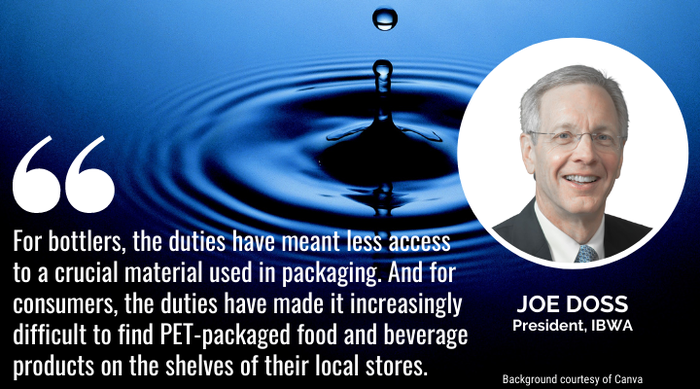International Bottled Water Association makes a strong case why PET resin import duties collected since 2016 should lapse.

It’s not a Boston Tea Party type revolt on behalf of a popular polymer, but the International Bottled Water Association wants freedom from import duties placed on polyethylene terephthalate (PET) resin. It’s a watershed opportunity for 630 group members and numerous others who rely on PET resin, bottles, and other packaging including consumers.
It began in May 2016 when PET resin duties were levied by the US International Trade Commission (ITC) and Commerce Department. The ITC’s “sunset review” is underway to determine if the government should continue collecting those fees.
The reasons IBWA wishes to see the duty expire including, among others, troublesome, unintended consequences. For one thing, the group points to duty-dodging loopholes created by foreign companies. That’s aside from the current supply-chain hardships during a period when the availability of PET and other plastics is already constrained.
On January 27, the ITC conducted a hearing to hear from groups both in support and in opposition to the duties. Post-hearing briefs were filed February 7. The ITC is expected to conclude its review process by March 30, when a final decision will be made whether to rescind the order.

IBWA President Joe Doss navigates us through the issue and the impact.
Let’s begin with a brief backgrounder on the IBWA and your members.
Doss: Founded in 1958, the IBWA represents roughly 630 US and international bottlers and distributors that produce and deliver bottled water products, as well as the suppliers that serve them. Although IBWA represents companies of all sizes, the majority are small, locally owned bottlers.
Why was this Duty enacted in the first place?
Doss: The duties were first levied in 2016 to level the playing field for American PET resin producers. However, a small group of international companies based in Mexico, Thailand, and Taiwan have used — and continue to use — their US subsidiaries to profit from the orders. In fact, these producers now own all US PET resin manufacturing capacity despite overseas ownership.
Are US companies the only ones affected by the Duty Tax?
Doss: While the duties were imposed on overseas PET resin producers, their impact has trickled down to brands and consumers nationwide. For US-based bottlers, the duties have meant less access to a crucial material that is used in packaging. And for consumers, the duties have made it increasingly difficult to find PET-packaged food and beverage products on the shelves of their local stores.
What other market factors are exacerbating the problem?
Doss: Both unprecedented demand for PET resin and historic supply chain shortages have wreaked havoc on businesses that rely on this material. And given that there isn’t a clear end in sight to either the COVID-19 pandemic or the ongoing logistical challenges — some of which predate the pandemic — bottlers are in desperate need of relief.
To what extent can the PET Import Duties be distinguished from those other factors?
Doss: While recent supply chain issues have added fuel to the fire, the problem faced by brands in need of PET resin are not new. Since the 2016 orders were levied, the domestic producers — those with overseas ownership — have engaged in an import strategy that involves using an expansive network of foreign affiliate companies to supply PET resin to the US market.
In fact, American manufacturers are finding that they have been provided foreign-produced materials without their advance knowledge, and, in some instances, domestic producers have been unable to provide US‐made PET resin when requested. Several of the producers are pointing to their unfinished PET resin plant in Corpus Christi, TX, as an indication that additional capacity will soon be online. However, this facility will likely not begin PET resin production within the next three years.
What’s been the impact on brand owners and on consumers’ wallets?
Doss: The increased costs to manufacturers that result from the duties will be often passed along to American consumers. For brands, the duties have meant limited access to PET resin. In fact, roughly 20 US PET purchasers have reported supply constraints, with 13 reporting that overseas suppliers were unable to provide the requested order by refusing to bid on business or providing short shipments.
Will these PET supply chain disruptions have a lasting effect?
Doss: The duties, coupled with the supply chain disruptions, are creating serious, long-term problems for bottlers and other American manufacturers. Unless balance is restored to PET resin markets, we can expect to see that domestic PET producers will continue to fall short of meeting growing US demand.
Even prior to the pandemic, these producers were unable to meet the needs of American manufacturers. Previous testimony has revealed that total US demand for PET resin has reached 147% of the total domestic supply. We can only imagine what would happen to these markets if current COVID-19 trends continue.
What can the US plastics industry do?
Doss: While the US plastics industry can shine a light on the wide-ranging negative impacts of these duties and how they harm consumers, the ITC is the only one that can solve this problem. Our nation’s leading trade authority must use its ongoing “sunset review” to rescind the orders and ensure unrestrained access to more PET resin.
What will happen if the Duty continues? And if it ends?
Doss: If the duties were to remain in place, we can expect that manufacturers will continue to confront systemic problems with accessing PET resin. And this situation would only be made worse given that the supply chain crisis is far from being resolved. Foreign-owned companies would continue to reap the benefits of the orders, profiting at the expense of American manufacturers and consumers.
If the ITC were to rescind the duties, American businesses would be provided with unhindered access to additional supplies of PET resin, which would be critical to addressing the ongoing supply chain crisis. As a direct result, consumers would have an easier time finding everyday products. Families and brands, those that are right here in the US, would stand to benefit. Simply speaking, it would be a win for everyone across the board.
About the Author(s)
You May Also Like




